204秋九年级英语u7 A 2a-2d
unit7 SectionA 2a-2d 课件人教版英语九年级全册

What does Molly think of Kathy’s statements? Listen and circle A for Agree, D for Disagree or DK for Doesn’t Know.
Kathy
Molly
1. Sixteen-year-old should not be allowed to work at night.
Unit 7 SectionA 2a-2d
Made by Mary 1
Learning goals
Words and expressions: choose their own clothes; driver's license; parttime jobs; get one's ears pierced; wear earrings; sb. be allowed to do sth
Sandy and Wu Lan are really
_e_x_c_i_te_d__about _s_e_e_i_n_g__ the famous
paintings by Picasso. Sandy want to bring her
new camera to take _p_h_o_t_o_s_, but it is not _a_l_lo_w__e_d__ to take photos in the museum.
17
Thank you for your listenning!
18
10
Should
• wear the school uniform • keep quiet in the library • eat outside of the classroom • practice what you have learned • make your bed after
人教版九年级英语第七单元Unit7 SectionA(2a-2d)-最新

Words and
expressions
community n. 社区;社团 keep…away from 避免接近;远离
Sandy: I’m going to bring my new camera to take lots of photos!
Wu Lan: Oh, no. Mr. Smith says we must not take photos. It’s not allowed in the museum.
School rules
Don’t wear long hair. (boys)
= Boys should not be allowed to wear long hair.
小结:英语表示同意或不同意的若干方法
非常赞同
I couldn't agree more! 我非常同意! That's absolutely true! 绝对没错! Absolutely! 肯定了! I'm with you on that. 我同意这点! That's exactly my opinion. 正是我所设想的!
=It's _e_x_c_i_ti_n_gfor me___to__s_e_e__th_e__f_a_m_o_u__s_p_a_i_n_ti_n_gs by Picasso
7.对于我们今年的假期旅行史密斯先生选择了艺术博 物馆我很高兴 _I_'m__g_l_a_d_M__r_.S__m_i_th__c_h_o_s_e__th_e__a_r_t_m__u_s_e_u_m__f_o_r_our
九年级英语unit7 2b一二段

• But we think our son need to think about other possible jobs.
• 但是我们认为我们的儿子需要考虑其他可能的 工作。
• He's getting older now,
• 现在他渐渐长大了,
• so he needs to think about what will happen if he doesn't end up as a professional runner." • what will happen if+ 一般现在时的句子
• Teenagers often think they should be allowed to practice their hobbies as much as they want. • as much as 和......一样多
• as+adj/adv+as 和......一样
• 青少年经常认为他们应该被允许尽可能多的按照他们所 想的去练习他们的爱好。
• 如果......将会发生什么事? • 所以他需要考虑如果他最终成不了一名专业的 赛跑运动员,那将会发生什么。 • .
知识点
• • • •
1. get in the way of 挡......的路;妨碍 2. as+adj/adv+as 和......一样 3. achieve one's dream 实现某人的梦想 4. have nothing against doing sth 不反对 做某事 • 5.what will happen if+ 一般现在时的句子 • 如果......将会发生什么事? • 6.sth happen to sb 某人发生了什么事 7.achieve 实现;主语是人 come true 实现;主语是物
人教英语九年级全册Unit7section A 1a—2d(共25张PPT)

Parents should allow teenagers to make their own decisions.
Parents should allow sixteen-yearolds to smoke.
Teenagers should be allowed to go out with their friends.
.Listen and circle T for true or F for false.
1. Anna can go to the shopping center
by bus.
TF
2. Anna wants to get her ears pierced. T F
3. Anna wants to choose her own clothes.
Sen: I want to get my ears pierced, could you please lend me some money?
Girl: No way. I don’t think sixteen-year-olds should wear earrings, especially boys!
What does Molly think of Kathy’s statements? Listen and circle A for Agree, D for Disagree or
DK for Doesn’t Know.
Kathy
Molly
1. Sixteen-year-old should not be A D DK
He is smoking. No smoking!
= You are not allowed to smoke!
【最新】人教英语九年级全册Unit7section A 1a—2d(共23张PPT).ppt

Students are not allowed to have part-time jobs.
I don’t think students should be allowed to have part-time jobs.
Students are allowed to study with friends.
I think students should be allowed to study with friends.
Do you agree? Or disagree?
Teenagers are not allowed to go to the Internet bar.
Practice
A: I don’t think sixteen-year-olds should be allowed to drive.
B: I agree. They aren’t serious enough./Because they are too young.
Explanation
Do your parents allow you to get your ears pierced? No, they don’t.
I don’t think teenagers should be allowed to get their ears pierced.
Do you agree? Or disagree?
Do your parents allow you to do the following things?
Do your parents allow you to watch TV? Yes, they do.
【最新】人教英语九年级全册Unit7section A 1a—2d(共22张PPT).ppt

Unit 7 Teenagers should be allowed to choose their own clothes.
SectionA
Period 1 1a-2d
Group work
ss in groups:
look at the pictures below. Let’s discuss them, then show your ideas.
Pair workAccording to the statements
above and make conversations like this.
I don’t think sixteen-yearolds should be allowed to drive.
I agree. They aren’t serious enough.
Role-play
1. Role-play in groups; 2. Role-play in front of the class.
You can do like this:
Do you think teenagers should be allowed to work at night?
Oh, I disagree with you. Teenage boys never get Well, maybe. But I thintkired. they should not work every night. That’s true. But they need time to have a rest.
I don’t think twelve-yearolds should be allowed to get their ears pierced.
人教版英语九年级全册Unit7 SectionA(1a-2d)名师教案

过程
措施〔教师活动与学生活动〕
目的
持续性评价
DELC4
1预备与激活先期知识Step 1Greeting and Leading in ( 3mins )
1.Greet the class.
2.T: There are many rules in our school or at our home .Can you share some with us? Can you watch TV on school nights?
S2:No. I don’t think students should be allowed to watch TV on school nights. Because we have to study?
T: Do you agree teenagers shouldn’t be allowed to get their ears pierced?(教授should’ t be allowed to)
DELC5
2
获取新知识
Step2
Pre-
lisetning
〔听前3mins)
Step 3
While-
Listening
〔听中〕
(5mins)
1:P49 1a
1)Read these sentences and understand their meanings.
2)Circle A or D.
3)Share answers in group
结合听力内容,进展目标句型学习与操练。
学生能否用目标词汇和句型讨论
Step 6
While-
listening
〔听中〕(13 mins
Unit7Section+A+2a—2d课件2022-2023学年人教版九年级英语全册
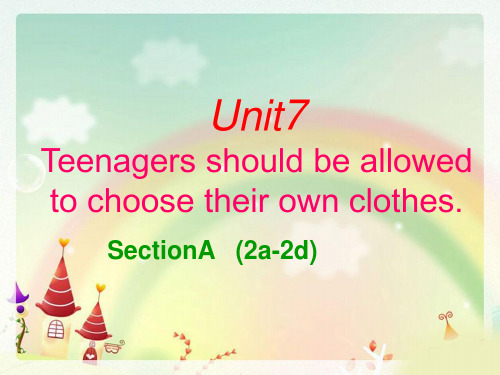
allowed to do
not be allowed to do
A: Do you think teenagers should be allowed
to have mobile phones? BB: :NYoe,sI.dIto’sn’ct othnivneknsieon. tPfeorhsatpusdesntutsdeanntsd pthaeyir pmaorreenatsttteonctioomn mtousnhicoarttemewsisthageeaschthoatnhetor. their studies.
3.我认为十六岁的青少年不应该被允许驾驶。
I _d_o_n_’t_ _th_i_n_k_ s_i_x_te_e_n__-y_e_a_r_-_o_ld_s_should be allowed to
drive. 4.我对毕加索的名画真的感到很兴奋。
I’m really e_x_c_i_te__d _a_b_o_u_t _se_e_i_n_g_the famous paintings
2c
Make a list of things teenagers should and should not be allowed to do. Discuss your
list with your partner.
What teenagers should be What teenagers should
School rules
Don’t sleep in class.
= Students should not be allowed to sleep in class.
2a What does Molly think of Kathy’s statements? Listen and circle A for Agree, D for Disagree or DK for Doesn’t Know.
人教新目标版英语九年级全册Unit7SectionB2a2b教案

Unit 7 Teenagers should be allowed to choose their own clothes.Section B 2a-2b 教学设计教学目标:1.会读会写下列词汇:support, enter, choice. 能理解运用下列短语:get in the way of.2.能听懂接近自然语速的故事和叙述,整体感知,了解文章大意。
3.能用简单的阅读策略获取信息,理解文章并完成阅读任务。
4.巩固学习should/should not be allowed to do的被动语态,勇于发表自己的观点和意见,懂得听取有益的建议。
教学重点:1.根据上下文理解重点单词和词组的意思。
2.能用简单的阅读策略获取信息,理解文章并完成阅读任务。
教学难点:在理解文章的基础上,巩固学习含情态动词的被动语态,并学会运用和拓展。
教具准备:多媒体教学过程:Step1.Warm-up and lead inUse a small toy to cheer up and have a free talk according to 2a.Step2.Show the study aims.Step3.Self-study1.Listen to the tape and finish:task1:Underline the new words and phrase in the passage and guess their meanings:get in the way of,support, enter, choice.task2:What’s the main idea of the passage?(After listening,teach the new words again and ask the question.)2.Skim the passage and circle T or F.3.Read carefully and fill in the chart.Step4.C ooperation & Competition1.Find out the sentences which including ‘shoul d be allowed to' in the passage.2.Write your own sentences with ‘should/should not be allowed to do’ on your grouppaper ,as many as you can,and have a competition with other groups.Step5.Summary and enjoy a songShould you be allowed to make all the decisions by yourselves?Step6.Practice1.Do a match.2.Choose the right answer.Step7.Homework1.Remember the new words and phrases in this lesson.2.Read the passage aloud after class.3.Finish the exercise book and prepare next period.Step8.Listen to the song “Be What You Wanna Be”.。
九年级英语七单元2b知识点
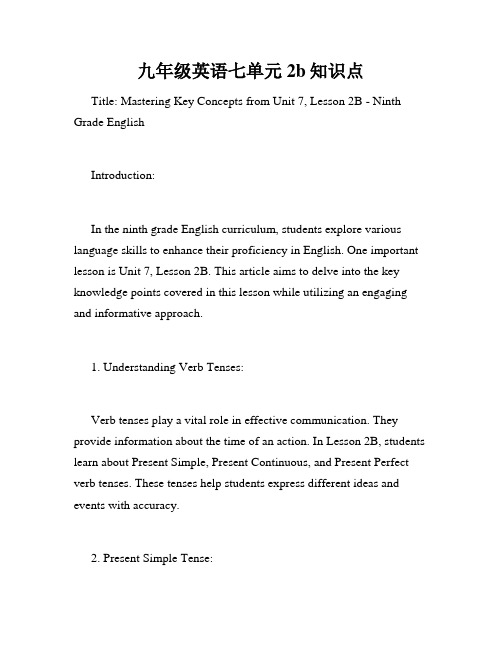
九年级英语七单元2b知识点Title: Mastering Key Concepts from Unit 7, Lesson 2B - Ninth Grade EnglishIntroduction:In the ninth grade English curriculum, students explore various language skills to enhance their proficiency in English. One important lesson is Unit 7, Lesson 2B. This article aims to delve into the key knowledge points covered in this lesson while utilizing an engaging and informative approach.1. Understanding Verb Tenses:Verb tenses play a vital role in effective communication. They provide information about the time of an action. In Lesson 2B, students learn about Present Simple, Present Continuous, and Present Perfect verb tenses. These tenses help students express different ideas and events with accuracy.2. Present Simple Tense:The Present Simple tense is used to describe general truths, habits, routines, and permanent situations. For example, "The sun rises in the east" or "I play tennis every Sunday." It is important to note that in the third person singular form, "s" or "es" is added to the verb (e.g., "He plays football").3. Present Continuous Tense:The Present Continuous tense is utilized to express actions happening at the time of speaking or actions planned for a definite future time. For example, "She is studying for her exam" or "We are going to the mall this evening." The structure of this tense involves the verb "to be" (am, is, are) followed by the present participle of the main verb (-ing form).4. Present Perfect Tense:The Present Perfect tense is used to connect the past and the present. It indicates actions that happened at an indefinite time in the past or have just been completed. For example, "I have visited New York three times" or "She has just finished her homework." The structure of thistense consists of the auxiliary verb "have/has" followed by the past participle of the main verb.5. Differentiating Verb Tenses:Understanding the differences between these verb tenses is crucial for precise communication. While the Present Simple and Present Continuous tenses describe current situations and habits, the Present Perfect tense focuses on past experiences with present relevance.6. Common Mistakes and Tips:Common errors in using verb tenses can hinder effective communication. Students often fall into the trap of using Present Continuous tense instead of Present Simple tense when talking about routines or habits. For example, saying "I am watching TV every day" instead of "I watch TV every day." Awareness of these pitfalls can help students avoid such mistakes.Additionally, in the Present Perfect tense, students sometimes struggle with choosing the correct auxiliary verb (have/has) and past participle form of the main verb. Practicing various exercises andseeking clarification from teachers can aid in overcoming these challenges.Conclusion:Unit 7, Lesson 2B of ninth grade English introduces students to essential verb tenses: Present Simple, Present Continuous, and Present Perfect. A strong grasp of these tenses allows students to express information accurately, convey habits, and describe past experiences with present relevance. By understanding the differences between these verb tenses and avoiding common mistakes, students can enhance their fluency and confidence in English communication.。
Unit 7 Section A(2a-2d)九年级英语全册(人教版)
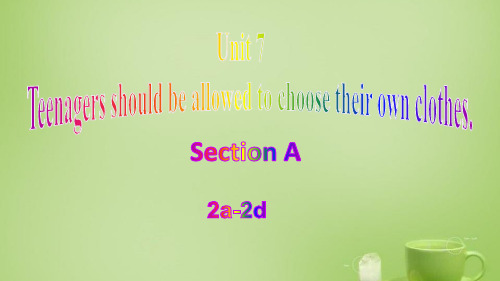
WaPrremsenintatgionup Pre-listening
Do you have any rules at school? Can we teenagers/ˈti:neɪdʒə/ do it?
Do your parents allow you to travel with friends?
Yes, they do.
We are allowed to travel with friends.
I think teenagers should be allowed to travel with
3. He should cut his hair.
A D DK
A D DK A D DK
4. He should stop wearing that silly earring. A D DK
5. He doesn’t seem to have many friends. A D DK
2b Listen again. What are Kathy’s and Molly’s reasons?
What teenagers should What teenagers should
be allowed to do
not be allowed to do
.......
.......
2c
Make a list of things teenagers should and should not be allowed to do according to your own opinions.
人教版英语九年级上册 Unit 7 Section A (2a-2d)
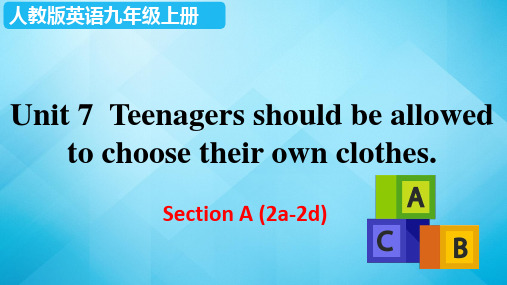
Con Side
Teenagers should not be allowed to do part-time jobs.
Arguments
✓ unsafe ✓ less time and energy
for study ✓ may be bad for health ✓ ...
Pre-listening Look at the picture and read the following statements in 2a, try to answer the questions.
It’s not allowed in the museum.
Sandy:That’s too bad! Do you think we may be allowed to take photos if we don't use a flash?
Wu Lan:Hmm...I think they just want to protect the paintings. So if you don’t use a flash,then it may be OK.
Pro Side
Teenagers should be allowed to do part-time jobs.
Arguments
✓ make some money ✓ learn a lot from part-
time jobs ✓ improve practical
skills ✓ make more friends ✓ ...
Should
Should not
wear the school uniform keep quiet in the library eat outside of the classroom practice what you have
九年级英语第七单元2d知识点
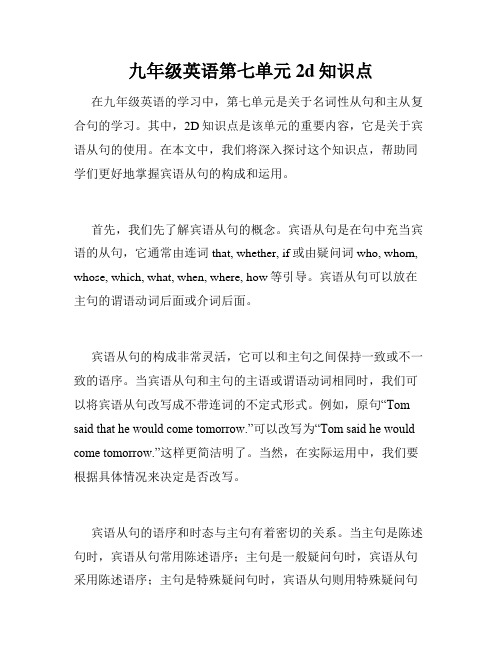
九年级英语第七单元2d知识点在九年级英语的学习中,第七单元是关于名词性从句和主从复合句的学习。
其中,2D知识点是该单元的重要内容,它是关于宾语从句的使用。
在本文中,我们将深入探讨这个知识点,帮助同学们更好地掌握宾语从句的构成和运用。
首先,我们先了解宾语从句的概念。
宾语从句是在句中充当宾语的从句,它通常由连词that, whether, if或由疑问词who, whom, whose, which, what, when, where, how等引导。
宾语从句可以放在主句的谓语动词后面或介词后面。
宾语从句的构成非常灵活,它可以和主句之间保持一致或不一致的语序。
当宾语从句和主句的主语或谓语动词相同时,我们可以将宾语从句改写成不带连词的不定式形式。
例如,原句“Tom said that he would come tomorrow.”可以改写为“Tom said he would come tomorrow.”这样更简洁明了。
当然,在实际运用中,我们要根据具体情况来决定是否改写。
宾语从句的语序和时态与主句有着密切的关系。
当主句是陈述句时,宾语从句常用陈述语序;主句是一般疑问句时,宾语从句采用陈述语序;主句是特殊疑问句时,宾语从句则用特殊疑问句的语序。
在时态上,宾语从句的时态通常根据宾语从句的意思而定,例如,“I don't know if he will come.”中的宾语从句用的是将来时。
在使用宾语从句的时候,我们需要注意几个常见的问题。
首先,当主句是带有情态动词的陈述句时,宾语从句中的谓语动词要使用动词的原形。
例如,“She said that she could swim.”中的宾语从句中的动词“swim”使用了原形。
其次,当宾语从句是一般疑问句时,要将原疑问句的疑问词改为陈述词。
例如,“Do you know where he lives?”中的宾语从句改写为陈述句:“You know where he lives.”最后,有时候我们可以省略宾语从句中的连词,但要保留主句的谓语动词后面的that。
人教版英语九年级课件unit7sectiona2a-2d

He needs time to do homework.
It doesn’t look clean.3来自用所给动词的正确形式填空。
1. I think one day books may
be replaced (replace) by computers. __________
be thrown 2. Paper should not __________ (throw) away.
Listen and circle A for agree, D for 2a disagree or DK for Doesn’t know.
Kathy
1. Sixteen-year-olds should not be allowed to work at night. 2. Larry shouldn’t work every night.
Listen again. What are Kathy’s and Molly’s reasons? Number their reasons in the correct order.
4 1 5
It looks cool.
Young people need to sleep.
He needs to spend time with friends.
Sample dialogue 1
A: Do you think teenagers should
be allowed to have mobile phones? B: Yes, I agree. It’s convenient for
students and their parents to communicate with each other.
新人教版九年级英语 unit7 Section A-2-优质课件.ppt
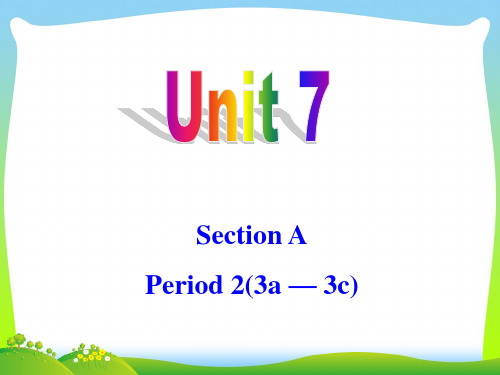
keep silent
quarrel
have a discussion
3a Read the poem and discuss what the title means.
Yes, she can.
3b Read again and answer the questions.
1. What did the mom do when the writer was a baby and a small child?
He is strong enough to lift the box. 他很强壮,能举得起这只箱子。
He was too weak even to lift his hand. 他虚弱得连手都抬不起来。
The dog lifted up its ears. 狗竖起了耳朵。
lift one's glass 举杯 lift one's head 抬头 lift one's spirits 提起精神 lift one's voice 提高嗓门
Sun Fei.
4. After reading the whole poem, how do you think the writer feels about his mom?
She isn’t allowed to get her ears pierced.
How do you get along with your parents? Talk about one thing you disagreed with them and how you dealt with it.
7. Be it ever so humble, there is no place like home. — John Howard Payne, American dramatist and actor 金窝,银窝,不如自家的草窝。 ——美国剧作家、演员 J. H. 佩恩
九年级英语7单元2d知识点
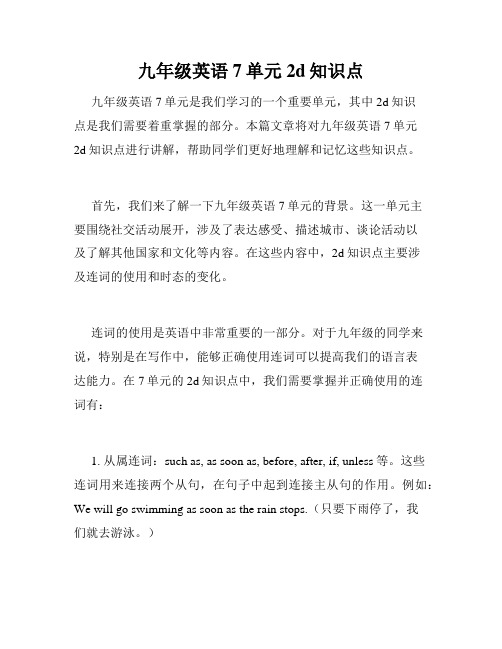
九年级英语7单元2d知识点九年级英语7单元是我们学习的一个重要单元,其中2d知识点是我们需要着重掌握的部分。
本篇文章将对九年级英语7单元2d知识点进行讲解,帮助同学们更好地理解和记忆这些知识点。
首先,我们来了解一下九年级英语7单元的背景。
这一单元主要围绕社交活动展开,涉及了表达感受、描述城市、谈论活动以及了解其他国家和文化等内容。
在这些内容中,2d知识点主要涉及连词的使用和时态的变化。
连词的使用是英语中非常重要的一部分。
对于九年级的同学来说,特别是在写作中,能够正确使用连词可以提高我们的语言表达能力。
在7单元的2d知识点中,我们需要掌握并正确使用的连词有:1. 从属连词:such as, as soon as, before, after, if, unless等。
这些连词用来连接两个从句,在句子中起到连接主从句的作用。
例如:We will go swimming as soon as the rain stops.(只要下雨停了,我们就去游泳。
)2. 并列连词:and, but, or, so, because等。
这些连词用来连接两个独立的句子或短语,在句子中起到连接作用。
例如:I like playing basketball, but I don't like playing football.(我喜欢打篮球,但不喜欢踢足球。
)3. 转折连词:although, despite, however, nevertheless等。
这些连词用来表示转折的关系,在句子中起到连接作用。
例如:Although it was raining, we still went for a walk.(尽管下雨了,我们还是出去散步了。
)除了连词的使用,时态的变化也是九年级英语7单元2d知识点中的重要部分。
时态的正确运用可以帮助我们表达过去、现在和将来的动作和状态。
在这一单元中,我们需要着重掌握以下几个时态的变化:1. 一般现在时:表示经常性的动作或现在的状态。
人教英语九年级全册Unit7section A 1a—2d(共23张)-课件
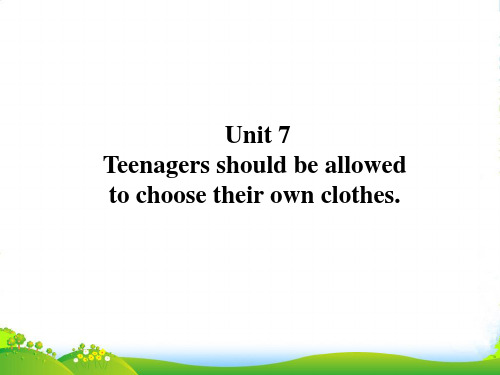
Do your parents allow you to exercise? Yes, they do.
We are allowed to exercise.
We should be allowed to exercise.
Do your parents allow you to smoke? No, they don’t.
My family has some rules. Look at these pictures and tell me what they are.
I am not allowed to…… play computer games watch TV listen to music make my room a mess
I don’t think teenagers should be allowed to go to the Internet bar.
Students are not allowed to have part-time jobs.
I don’t think students should be allowed to have part-time jobs.
Students are not allowed to smoke.
Students shouldn’t be allowed to smoke.
Do your parents allow you to drive? No, they don’t.
Students are not allowed to drive.
Students are allowed to study with friends.
I think students should be allowed to study with friends.
- 1、下载文档前请自行甄别文档内容的完整性,平台不提供额外的编辑、内容补充、找答案等附加服务。
- 2、"仅部分预览"的文档,不可在线预览部分如存在完整性等问题,可反馈申请退款(可完整预览的文档不适用该条件!)。
- 3、如文档侵犯您的权益,请联系客服反馈,我们会尽快为您处理(人工客服工作时间:9:00-18:30)。
Kathy
Molly
A D DK 1. Sixteen-year-old should not be allowed to work at night. 2. Larry shouldn’t work every night. A D DK 3. He should cut his hair. A D DK
4. He should stop wearing that silly earring. 5. He doesn’t seem to have many friends.
A D DK A D DK
Listen again. What are Kathy’s and 2b Molly’s reasons? Number their reasons in the correct order.
答案: 3. can’t be 4. don’t; should 5. It seems that
Ⅱ. 句型转换
1. We should allow teenagers to )
Teenagers_______ _______ ________ to have
their own ideas.
2. You mustn’t take photos in the museum. (改为
__ 4 It looks cool. __ 1 Young people need to sleep. __ 5 He needs to spend time with friends. __ 2 He needs time to do homework. __ 3 It doesn’t look clean.
4. I think we should go there before 8: 00. (改为否定句)
I_____ think we______ go there before 8: 00.
5. The boy seems to have many friends. (改同义句)
______ ______ ____ the boy has many friends.
1. Teenagers should be allowed to have their own ideas
The classroom must be cleaned every day.
Your homework can be finished tomorrow.
__________________________________________
Read 2d and answer the questions: 1. How does Sandy feel about seeing the famous
paintings by Picasso?
Really excited.
2. Who chose the art museum for their school trip?
Mr. Smith. 3. Why is Sandy going to bring his new camera? To take lots of photos. 4. How does Wu Lan think they may be allowed to take
photos if they don't use a flash?
答案: 否定句: 在情态动词后面加not。
疑问句: 将情态动词提到主语前面。
Ⅰ. 用所给词的适当形式填空 1. More and more people care about the food_____ (safe). 2. He is going to get his computer_______ (repair). 3. We stopped____ (talk) when our teacher came in. 4. He is excited about___ (see) the famous actor. 5. Students shouldn’t be allowed____ (go) out on school night. 答案: 1. safety 2. repaired 3. talking 4. seeing
被动语态)
Photos_____ _____ ________ in the museum.
答案: 1. should be allowed 2. mustn’t be taken
3. Your bike can be put behind the building. (改为否定句)
Your bike____ ____ put behind the building.
Unit 7 Teenagers should be allowed to choose their own clothes.
Section A (2a-2d)
What does Molly think of Kathy’s statements? 2a Listen and circle A for Agree, D for Disagree or DK for Doesn’t Know.
She thinks it may be OK.
Fill in the blanks and try to retell the text.
Sandy and Wu Lan are really seeing the famous ________about ________ excited paintings by Picasso. Sandy wants to bring photos but it is her new camera to take _______, allowed to take photos in the not _________ museum. Sandy thinks that she may be allowed to take photos ______ if she doesn’t use _______a flash.
stop doing sth 停止做某事(不做其他的事) stop to do sth 停下来去做某事
Picasso paintings
the Art Museum
school trip
They are using a flash to take photos.
No photos ! You are not allowed to take photos. We must not take photos.
• 短语翻译: • 1. be worried about • 2. get ears pierced • 3. spend time with friends • 4. be excited about • 5. take photos 6. stop wearing that silly earring stop doing sth stop to do sth
短语翻译: 1. be worried about 2. get ears pierced 为……担心 打耳洞
3. spend time with friends 和朋友一起度过时间
4. be excited about
5. take photos
对……感到兴奋
拍照
6. stop wearing that silly earring 停止带那愚蠢的耳环
答案: 情态动词+be+动词的过去分词
2. The book shouldn’t be taken out of the library.
Rubbish can’t be thrown off everywhere.
Must the trees be planted today?
___________________________________________
